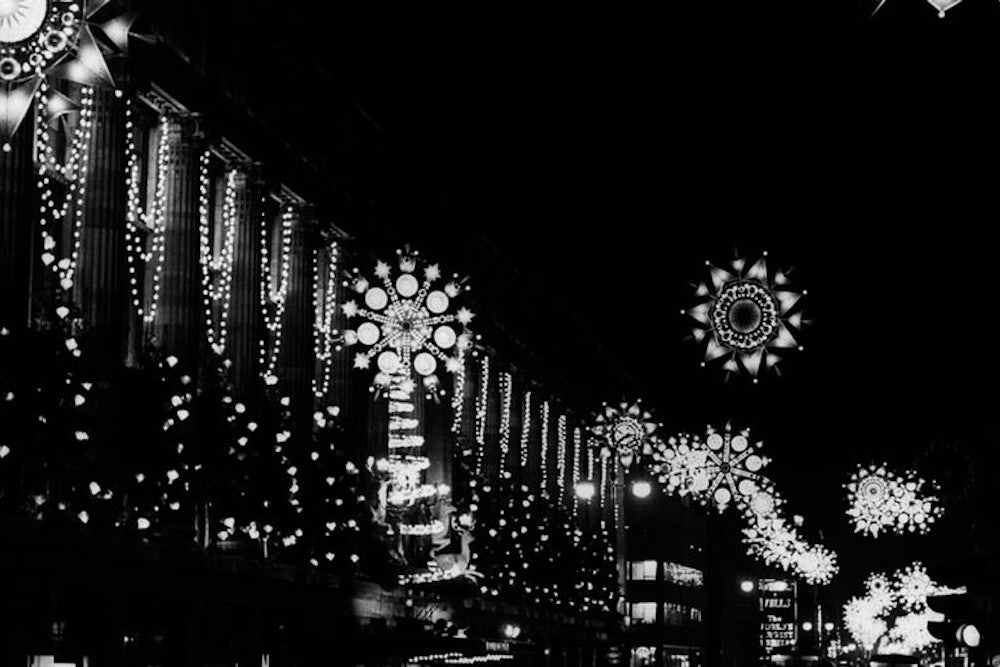In what may well be the season’s best Christmas story, Icelandic activists have stalled the construction of a highway because they are afraid for the safety of the local elf population. Most of the time, facts have their place as rightful arbiters of action. Elves do not normally qualify. Friends of Lava, the group leading the effort against the highway, is concerned about the environment and Iceland’s cultural heritage, which is where the elves come in. Friends of Lava say there is a chance that elves are real—and their complaint is well-timed. At Christmas, delusion can be beautiful.
At this time of year, the world becomes enchanted. Stores and houses are decked out in lights; music tells us all to embrace the Christmas spirit. It can be annoying: I’ve been heckled on the street nearly daily by people seeking money for charities. ("What’s the greatest nation?" Not the United States. Turns out it’s a donation. My donation was a groan.)
But at some point the veneer of kitsch fades away and reveals genuine sentiment—the genuine beauty it’s been masking ever since the turkey accessories left the supermarket shelves. For once, as if it were the 1960s again, the country listens to the same music—and most of it is really pretty good. Work demands fade away; everyone wants to be with family. Movie releases give us more common currency, and the fantasies of the big screen make life more exciting, more rife with humor and adventure.
Some of the charitable spirit infects us. (The New York Times’ exhortation to “remember the neediest” always seemed the most tactful to me.) Newspapers toss their most touching features on our doorsteps, and strangers wish each other a merry Christmas. It’s hard not to fall in love with seasonal heroes Ralphie and Tiny Tim.
Best of all, the kids believe in Santa. I’ll admit I never did: Christmas can be hard for Jewish kids. The whole world seemed to want to shut me out because I didn't care about Santa or Jesus, and everyone else did. For a long time, I resented the holiday that wasn’t mine. But after enough December 25ths I came to love the deserted streets of my neighborhood, as everyone else huddled indoors for mysterious family rituals. I could roam deep into the night entirely without care, and I realized that the world was mine on Christmas, even if the holiday was not. The lights and tinkering music from the neighbors’ houses didn’t beckon me, but they were the backdrop to a season when I, too, could leave my work behind and enjoy the still world in a new way. All was alive and fresh; I could have been in a fairy tale. I grew sympathetic to the children who believed in Santa.
In that Christmas world, one might even believe in elves.
The great theologian and writer G.K. Chesterton knew the world was most beautiful—and most human—when it was enchanted. As a boy, he wondered that he was given life and was thankful, though he didn’t know whom he ought to thank. The world was best understood, he knew, as a fairy tale. As he explained in Orthodoxy, scientific laws are philosophically unsatisfactory—they can explain how things work, but they don’t touch the mystery of why:
When we are asked why eggs turn to birds or fruits fall in autumn, we must answer exactly as the fairy godmother would answer if Cinderella asked her why mice turned to horses or her clothes fell from her at twelve o'clock. We must answer that it is MAGIC.…The only words that ever satisfied me as describing Nature are the terms used in the fairy books, "charm," "spell," "enchantment." They express the arbitrariness of the fact and its mystery. A tree grows fruit because it is a MAGIC tree. Water runs downhill because it is bewitched. The sun shines because it is bewitched.
It doesn’t have to be religion that enchants the world; it could be a renewed sense of curiosity or a heightened care for goodness to others. But Christmas popularizes the fantastic side of things and reminds us all that elves are worth believing in.
